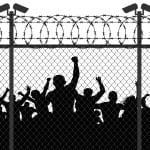
On Februrary 4th, we has the pleasure of meeting with Sophia Henager. Ms Henager is a Law Fellow from the Equal Justice Initiative. She has a Bachelor’s Degree in political science and international relations from Gonzaga University and is a 2020 graduate of New York University School of Law. Her main focus is on cases involing life sentences and the death penalty. She gave us very helpful information regarding these types of cases.
Sophia started off with talking about the issue with mass incarceration. She explained how it mainly affects the black community. Black people were more likely to be arrested for having drugs, yet white poeple have been reported to have it more often. In 1971, Richard Nixon declared a war on drugs, which was actually a ploy to imprison more people of color. It was used to make black people look like heavy drugs users. This statement alone raised the incarcerated population from 300,000 to 2,000,000.
She also talked about unfair sentences. In the 1990s, Bill Clinton passed the Violent Crime Control Act bill. It stated that if someone gets 3 felonies, one violent in them, they can be incarcerated for life. People in povetry have been incarcerated for life for non-violent crimes such as stealing little items due to this law, and it shows how much the justice system needs to improve.
Our group enjoyed taking with Sophia, and we took in a bunch of information. This Equal Justice Initiative is a wonderful organization, and I wish to talk with more people from there soon.








